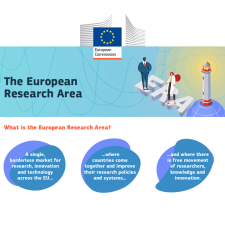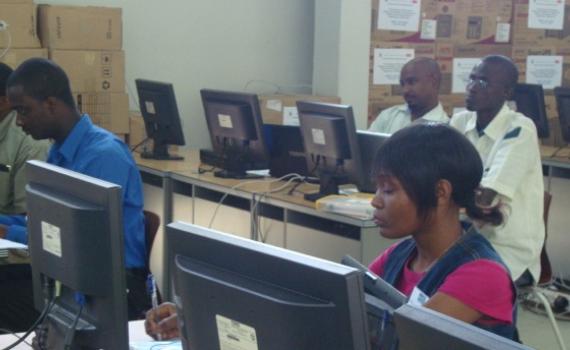
The latest phase of funding for the EIFL-FOSS programme ran from 2010 to 2013
As the EIFL Free and Open Source Software (FOSS) programme draws to a close, we look back on a four-year programme of innovative activities using and promoting free software in libraries.
In doing so, we celebrate the funding from Open Society Foundations Information Program that allowed the programme to take place.
“I am very proud of the work the EIFL-FOSS programme and partner librarians have accomplished using FOSS tools in the last four years,” says Simon Ball, EIFL-FOSS Programme Manager.
“Our hard work and FOSS tools have enabled libraries to maximize access to knowledge. A wealth of useful resources has also been produced, and many of these are signposted in this article.”
Webinars and themed weeks
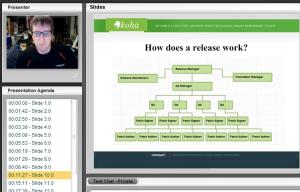
The FOSS programme introduced webinars to the EIFL family in 2011, and since then has delivered 31 free webinars on a variety of FOSS topics, ranging from introductions to certain types of software to more detailed training and Q&A sessions with experts and developers.
In all, the webinars were attended by 786 people from 74 different countries. Recordings of the webinars are also freely available, and on average each recording is viewed by many more people than attended the original webinar. All of the recordings remain available to view on our website.
The webinars have been highly valued by those who attended:
-
"The webinars I attended were of great value. I learned and shared the output with my colleagues" - Mandy Taha, Senior Librarian at Library of Alexandria, Egypt
"The webinars have been informative in nature, helpful and they have provided knowledge on a wide scope of software to choose from. The recorded webinars have provided ample time to review and further understand the presentations.” - Judith Nannozi, Head Librarian at Uganda Martyrs University -
“This is very fast and easy way to learn. More of such webinars should take place” - Richard Bruce Lamptey, IR Librarian at KNUST, Ghana
Library management systems pilots and case studies
Building upon an earlier series of pilots with the two most popular free library management systems, we started this programme by updating the five prior pilots with new developments since the original pilots were published. You can read about Koha and Evergreen on our website.
We then set about commissioning even more pilots in this area, including:
- The creation of a union catalogue across three libraries in Nepal using Koha;
- The use of J-ISIS to update legacy WIN-ISIS-based archives in Armenia;
- The use of OpenBiblio to support small and rural libraries in Armenia to develop digital catalogues.
Even by the close of the EIFL-FOSS programme library management systems software remains the most popular topic of enquiry, showing that interest in these tools continues to thrive.
Improving library services with FOSS tools
To discover licensed e-resources and better serve people with various disabilities we looked into FOSS tools that could address those two library needs.
After conducting two pilot projects in the use of SubjectsPlus to develop subject guides in Zimbabwe and the use of free software to support disabled library patrons in Zimbabwe – it was clear there was increased interest from libraries in using these FOSS tools, but that a lack of clear instructional material was hampering progress. So we produced Step-By-Step guides to installing and using i) SubjectsPlus and ii) a range of Accessibility / Disability tools. These were followed up with further case studies implementing SubjectsPlus in Kyrgyzstan and Cambodia, and utilising the accessibility/disability tools in Malawi and Serbia. A Facebook group is moving forward to support libraries interested in using FOSS tools to support their disabled patrons.
Advocacy resource
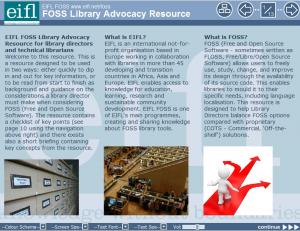
One of the lessons that emerged from early work on the FOSS programme was that much more work needed to be undertaken in terms of providing advocacy resources. We developed an advocacy resource that targeted all stakeholders including FOSS librarians, technicians, library directors and decision-makers.
You can access the EIFL-FOSS Library Advocacy Resource on our website.
Feedback from users of the resource has been positive:
-
“As a result of using this resource I will suggest a FOSS advocacy unit within the consortium”
-
“This resource may give me better bargaining power in advocating for FOSS tools both within and without the institution”
-
“I am now confident that I am able to advocate for FOSS”
-
“I can now plan a roadmap for FOSS advocacy....within our institution”
Regional training seminar
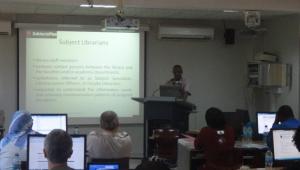
We were fortunate to obtain additional funding from UNESCO for a Regional Training Seminar, which took place in Tanzania in November 2011. Fourteen countries from Africa were represented amongst the 35 delegates, with most countries sending one FOSS librarian / technician and one library director, in order to build better understanding of library FOSS tools at several levels within the library community.
The programme was structured so that about half of the time the audience was all together, and for the remainder they divided into the two role groups, with the FOSS librarians receiving intensive training on key software and the directors debating management issues and advocacy.
Follow-up surveys indicated most participants had disseminated information learned at the event and many had installed various FOSS software tools as a result.
Publications and resources
We have published two articles, created an A-Z of FOSS for libraries, distributed a DVD of resources to all FOSS Coordinators, and assisted in helping to turn a programme of Greenstone implementation projects into the African Digital Library Support Network.
Here are some things people have said about the EIFL-FOSS programme:
-
“As with other EIFL programs, the EIFL-FOSS programme helps us a lot. It opens our eyes for looking to another way of utilising software, to implement a lot of beautiful technological pieces developed by good people from Open Source Community. Practical and fruitful webinars give us a lot of ideas to improve our services to the end-user community. If you want to find practical solutions or you need an advice how to develop something, the EIFL-FOSS program is the best place to participate.” - Biljana Kosanovic, Head of the Department of Scientific Information at National Library of Serbia
-
“If it weren't for the Free and Open Source Software Programme for libraries, our libraries (those with small and poorly funded budgets) would still be behind in library technologies and performance thereby.” - Judith Nannozi, Head Librarian at Uganda Martyrs University
-
“With the dwindling of support for libraries and the rising demand of quality services from the users; libraries today are faced with an enormous challenge in service delivery. EIFL-FOSS for libraries is of extreme significance, given that we are now empowered to mount services with equally good software as the proprietary ones at very minimum budgets. I fully support this initiative” - Evan Njoroge, ICT Librarian, Kabarak University, Kenya
EIFL-FOSS tools and resources will continue to remain available on the EIFL website.
January 2014 PDF VERSION
Interested in providing support to the EIFL-FOSS programme? Please contact us or make a donation online. Thank you for your continued support.
SHARE / PRINT






